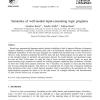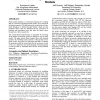1117 search results - page 23 / 224 » Partial Models of Extended Generalized Logic Programs |
105
click to vote
ICLP
2003
Springer
15 years 7 months ago
2003
Springer
Logic programming is based on the idea that computation is controlled inference. The Extended Andorra Model provides a very powerful framework that supports both co-routining and p...
115
Voted
ICLP
2001
Springer
15 years 7 months ago
2001
Springer
Multi-adjoint logic programs has been recently introduced [9, 10] as a generalization of monotonic logic programs [2, 3], in that simultaneous use of several implications in the ru...
115
Voted
JELIA
2000
Springer
15 years 6 months ago
2000
Springer
In previous work, we developed a framework for expressing general preference information in default logic and logic programming. Here we show that the approach of Brewka and Eiter ...
122
Voted
CL
2000
Springer
15 years 2 months ago
2000
Springer
Recent logic programming languages employ dynamic scheduling of calls to improve e ciency of programs. Dynamic scheduling is realized by allowing some calls to be dynamically &quo...
104
Voted
SIGSOFT
2005
ACM
16 years 3 months ago
2005
ACM
Fluent model checking is an automated technique for verifying that an event-based operational model satisfies some state-based declarative properties. The link between the event-b...


